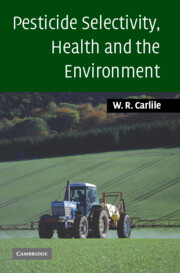Book contents
- Frontmatter
- Contents
- Preface
- Acknowledgements and permissions
- Trademarks and registered trademarks
- List of abbreviations and acronyms
- Units
- 1 The rationale, principles and regulation of pesticide use
- PART I PESTICIDES AND THEIR MODE OF ACTION
- PART II RISKS TO HEALTH AND THE ENVIRONMENT FROM PESTICIDES
- 6 Pesticide toxicology
- 7 Pesticides and human health
- 8 Pesticides in the environment
- 9 Pesticides and non-target species
- 10 Public perceptions, comparative risk assessment, and future prospects for pesticides
- References
- Index
6 - Pesticide toxicology
Published online by Cambridge University Press: 03 December 2009
- Frontmatter
- Contents
- Preface
- Acknowledgements and permissions
- Trademarks and registered trademarks
- List of abbreviations and acronyms
- Units
- 1 The rationale, principles and regulation of pesticide use
- PART I PESTICIDES AND THEIR MODE OF ACTION
- PART II RISKS TO HEALTH AND THE ENVIRONMENT FROM PESTICIDES
- 6 Pesticide toxicology
- 7 Pesticides and human health
- 8 Pesticides in the environment
- 9 Pesticides and non-target species
- 10 Public perceptions, comparative risk assessment, and future prospects for pesticides
- References
- Index
Summary
Introduction
Earlier chapters have indicated that some pesticidal molecules kill their target organisms quickly. In some cases, such as the pyrethroid insecticides, the death of target pests may be very fast indeed – a matter of seconds. Copper-based fungicides may kill fungal spores in minutes. Paraquat, given suitable conditions of strong sunlight, may kill plants within a day. Other pesticides may take a few days or weeks to kill their target organism, but may slow down or prevent further growth until death. Of course those involved in controlling unwanted organisms welcome this rapid action.
It is important that human beings do not experience similar short-term or acute effects from pesticidal molecules. The basis of selectivity of pesticides outlined in Chapters 3, 4 and 5 of this book and precautions taken during use of many compounds explain how their acute effects are encountered mainly by target species. However, pesticides such as the bipyridylium herbicides and some insecticides that block acetylcholinesterase activity have caused severe illness and death to human beings. The benefits of pesticides to human and animal health, crop production and storage, and in treatment of domestic and industrial premises must be set against the three million cases estimated by the World Health Organization (Harris, 2000) of acute, often life-threatening human poisonings and 100 000-plus deaths annually linked to these compounds. Most of these deaths occur in poorer countries, where inappropriate use of pesticides of high acute toxicity by poorly trained personnel has led to instances of acute poisoning and death.
- Type
- Chapter
- Information
- Pesticide Selectivity, Health and the Environment , pp. 135 - 155Publisher: Cambridge University PressPrint publication year: 2006



